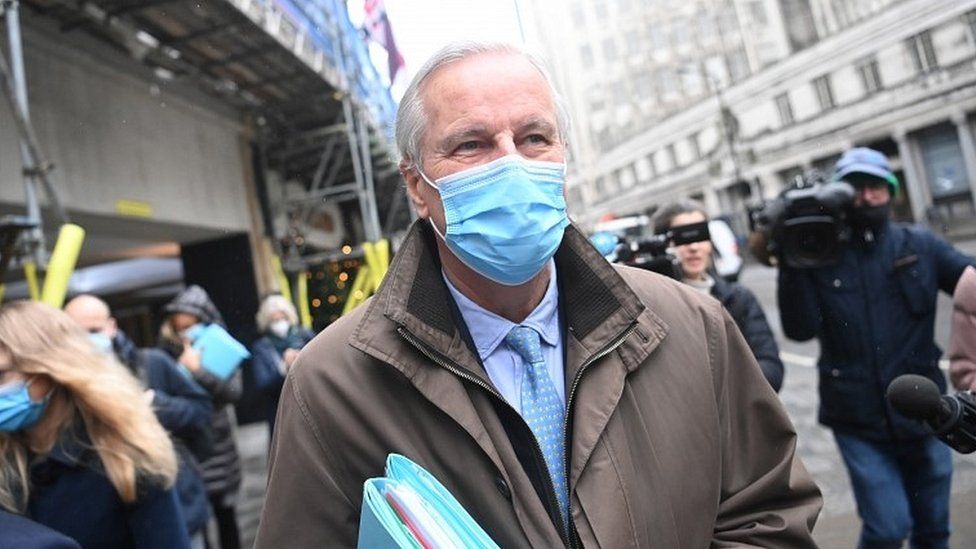Brexit: Time running out as Brexit trade talks restart
- Published
- comments

The UK and the EU have resumed talks on post-Brexit trade in London, with time running out to achieve a deal.
A senior UK government source said the prospects of a breakthrough were "receding" and accused the EU of making "11th-hour" demands.
But a Brussels source denied this, with EU chief negotiator Michel Barnier calling Friday an "important day".
Both sides have to agree and ratify any deal by 31 December, when the current rules on EU-UK trade end.
If they do not, they will do business on World Trade Organization rules, meaning the introduction of tariffs, or taxes on imports.
The negotiating teams are seeking compromises in key areas - including fishing rights and business competition rule - in time for EU leaders to discuss them at a summit scheduled for Thursday.
And, rather than returning to Brussels as planned on Friday, Mr Barnier is staying in London to continue discussions.
Brexit - The basics
- Brexit happened but rules didn't change at once: The UK left the European Union on 31 January 2020, but leaders needed time to negotiate a deal for life afterwards - they got 11 months.
- Talks are happening: The UK and the EU have until 31 December 2020 to agree a trade deal as well as other things, such as fishing rights.
- If there is no deal: Border checks and taxes will be introduced for goods travelling between the UK and the EU. But deal or no deal, we will still see changes.
Business Secretary Alok Sharma told BBC Radio 4's Today programme the talks were "in a difficult phase".
He added that the UK must be recognised as "a sovereign and independent nation" and it was "on the basis of that that a deal will be done".
Business Secretary Alok Sharma said "time is short" on Brexit negotiations
Fishing rights remain a major area of contention between the UK and France - one of the EU's most powerful members.
France's Europe minister, Clement Beaune, warned that his government could "veto" any deal reached between the UK and EU, if it did not satisfy his country's demands.
But European Council President Charles Michel urged the EU's 27 member states to maintain "unity" as negotiations continue.
With Brexit, talks don't just go to the wire. They go beyond it.
Remember, the UK left the EU nearly a year after it was intended. So the fact it's taking this long to reach a trade deal shouldn't come as a shock.
But there really is pressure in the next few days to declare "deal or no deal".
On Monday, the Internal Market Bill returns to the Commons. It would allow the UK to sidestep aspects of the agreement that was reached to leave the EU - and break international law in a "limited and specific way".
Brussels has warned the government that this could scupper a trade deal.
That aside, any deal would have to be ready before EU leaders are invited to sign it off at a summit on Thursday.
It doesn't augur well that the UK and EU are even disagreeing about their disagreements.
The government says Brussels has hardened its position on how competition rules are policed; the EU counters that it has made no new demands.
But it's not surprising that both sides are crying "ouch" as the thorniest issues are now being grasped.
But while No 10 talks of "setbacks", it hasn't yet said negotiations have broken down. While discussions between both sides continue, the prospect of a deal is still possible.
Any deal would have to be signed off by the European and UK Parliaments before it can come into force. It could also require eventual ratification in the 27 EU national parliaments, depending on the contents.
The UK and EU have been in negotiation since March to determine their future relations once the UK's Brexit transition period - under which it still follows most of the EU's rules - ends in less than four weeks' time.
Why is fishing so important?
Fishing is a tiny part of the overall economy on both sides of the Channel, but it has a political importance which allows it to punch well above its weight in these negotiations.
It was a big part of the Leave campaign in the run-up to the Brexit referendum in 2016, and it is a totemic issue for those who argue that national sovereignty must be fully regained.
But it's a sensitive issue in other countries as well. French President Emmanuel Macron will want to win regions with big fishing communities in the next presidential election in 2022. And any proposed deal needs the agreement of all EU countries - it can't just be signed off by the European Commission.
Related Topics
- Published18 December 2020
- Published1 January 2021